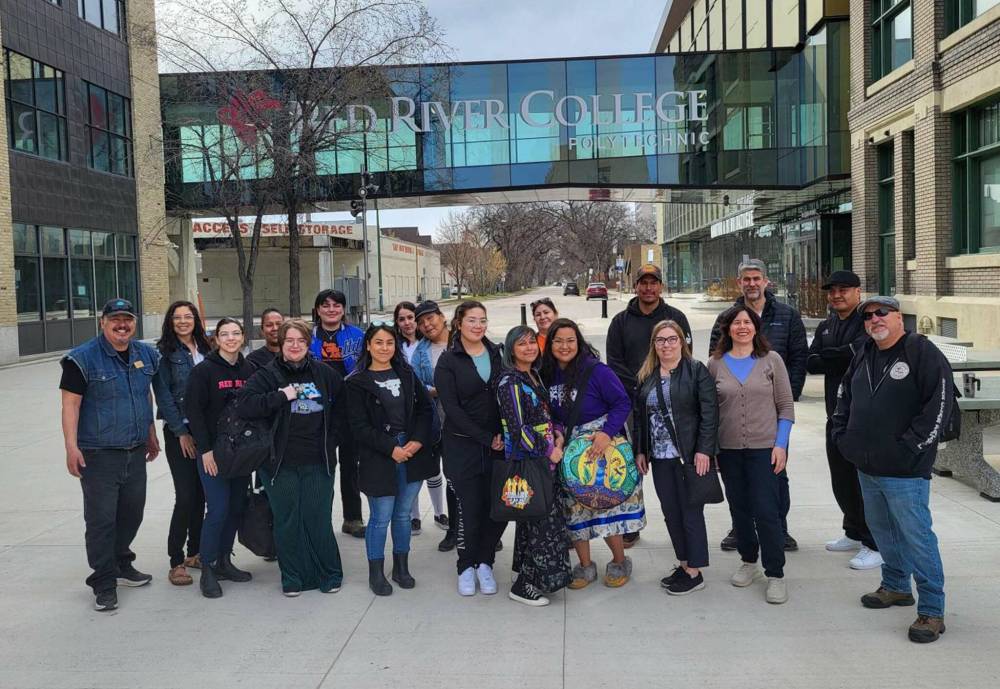Students find their voice — in Ojibwa
Advertisement
Read this article for free:
or
Already have an account? Log in here »
To continue reading, please subscribe:
Monthly Digital Subscription
$0 for the first 4 weeks*
- Enjoy unlimited reading on winnipegfreepress.com
- Read the E-Edition, our digital replica newspaper
- Access News Break, our award-winning app
- Play interactive puzzles
*No charge for 4 weeks then price increases to the regular rate of $19.00 plus GST every four weeks. Offer available to new and qualified returning subscribers only. Cancel any time.
Monthly Digital Subscription
$4.75/week*
- Enjoy unlimited reading on winnipegfreepress.com
- Read the E-Edition, our digital replica newspaper
- Access News Break, our award-winning app
- Play interactive puzzles
*Billed as $19 plus GST every four weeks. Cancel any time.
To continue reading, please subscribe:
Add Free Press access to your Brandon Sun subscription for only an additional
$1 for the first 4 weeks*
*Your next subscription payment will increase by $1.00 and you will be charged $16.99 plus GST for four weeks. After four weeks, your payment will increase to $23.99 plus GST every four weeks.
Read unlimited articles for free today:
or
Already have an account? Log in here »
Hey there, time traveller!
This article was published 21/06/2024 (525 days ago), so information in it may no longer be current.
A group of students ranging in age from under 18 to over 70 is the latest Red River College Polytechnic class to learn the power of the Ojibwa language.
About 26 students enrolled in this spring’s introduction to Anishinaabemowin (Ojibwa) evening course, which wrapped up June 20. The course was offered tuition-free thanks to private funding.
Instructor Corey Ralph Whitford said it felt like a community, not a classroom.

SUPPLIED
A class photo of the students in the most recent eight-week run of Red River College Polytechnic's introduction to Anishinaabemowin course.
“When the students come there, they’re looking for community, they’re looking for acceptance, and I offer that (through the course),” he said.
Whitford, who is from Sandy Bay First Nation on the western edge of Lake Manitoba, grew up speaking Ojibwa as his first language.
He spoke it primarily until he was 15, when he moved away to attend residential school. Now, his language skills and his ability to teach in a practical, energetic way are in high demand. There have been waitlists for the last two sessions of the course, and Whitford said he’s taught 150 students since 2018.
“I was born with it, and I lived it. I didn’t realize that until I got this job, that I have a unique talent that’s in very short supply,” he said. “It gives me purpose, it gives me a sense of responsibility, and I want to play my part.”
He starts with the basics: the 27-letter Anishinaabemowin alphabet, the Ojibwa online dictionary, real-time conversation, skits and collective reading circles.
“That’s where the real magic occurs. People feel like they find their voice in there; even people who were previously shy.”
“I didn’t realize that until I got this job, that I have a unique talent that’s in very short supply.”–Corey Ralph Whitford
Chantel Reles was one of the students who completed the course this week, presenting a 12-page animal-themed Anishinaabemowin children’s book as her final project.
“It’s so meaningful to me, and it’s very touching. It isn’t just about the language, it’s about connection and it’s about community,” Reles said, crediting the energy Whitford brought to the class.
“It was so special to make those connections throughout, and to see the joy and how people have been able to open up. I think that is what I’ve really taken away from this: to have confidence and speak the language more, and see my Indigenous friends and be able to greet them.”
The non-Indigenous employee of Red River College Polytechnic said she enrolled in the class because she wanted to join in on the Truth and Reconciliation Commission’s calls to action and do her part to help Indigenous people reclaim their languages.
“It’s not all on Indigenous people to learn. I think (it’s up to) other Canadians, newcomers and settlers, to be aware and participate in this.”
“It’s so meaningful to me, and it’s very touching. It isn’t just about the language, it’s about connection and it’s about community.”–Chantal Reles
Reles has seen the difference it makes to be able to greet people in their language.
“Now that I carry this knowledge, I can pass on what I know to my friends,” she said.
“As settlers, I think we still have a responsibility when it comes to Indigenous language, specifically if we’re looking at truth and reconciliation. That should be something that we’re all thinking about in Canada.”
In-person learning helped foster that sense of community in the class, Whitford said.
“We know that language lives, there’s a spirit in it, and so that’s how we’re treating it,” he said. “We’re decolonizing it by presenting it the way an Indigenous instructor would.”
The instructor expressed his congratulations to the class of 2024.
“We know that language lives, there’s a spirit in it, and so that’s how we’re treating it.”–Corey Ralph Whitford
“We had sort of a soft, subtle goodbye — it’s not goodbye. Actually, there is no word for ‘goodbye’ in our language. Instead we say, I will see you again: Giga wabamin miinawaa.”
katie.may@freepress.mb.ca

Katie May is a multimedia producer for the Free Press.
Our newsroom depends on a growing audience of readers to power our journalism. If you are not a paid reader, please consider becoming a subscriber.
Our newsroom depends on its audience of readers to power our journalism. Thank you for your support.

